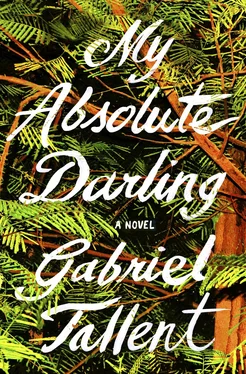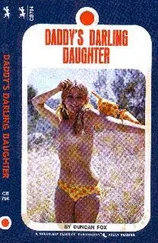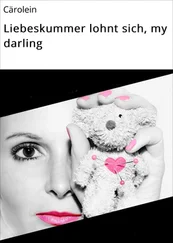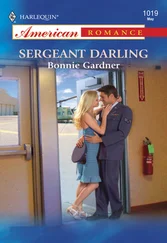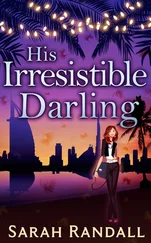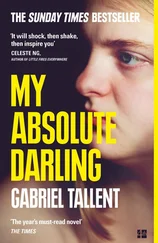“You can forgive me?”
“Yes,” she says, “I forgive you.”
She sinks back into the water, thinking and recoiling inside about what will happen if Grandpa tries to say what he’s seen, and she knows she should bring it up. Martin’s every failing is a secret between the two of them, and she feels that she’s violated that privacy. She can’t bear that anyone else should see something he’s done wrong. She rises out of the water, takes her hair in handfuls, and wrings it.
She stands up out of the tub and sees her figure reflected in the picture window, Martin behind her, leaning forward in the chair, squinting, scraping his thumb down the side of his jaw, and both of them looking at her, long legs barred black and green with bruises. She takes a towel from the rack and wraps it around herself and walks past him, her gait lopsided and short. He turns to watch her go by, his left eye seeming sadder than the right, his face lined with love and sorrow, and she goes up the stairs to dress, filled in every pore with his love, big and happy with it, and thinking vengefully, come what may. She has to stoop to retrieve her clothing from the shelves, exhaling softly, painfully, and she dresses gingerly, taking a great deal of time, and when she is done she stands looking out her window, biting her lip. She thinks, no, it will come to nothing. Looking out at the hillside, in places a graceful sweep of timothy and wild oats, in others gone to pampas and weed trees, down by the road the blooming purple-white radishes. She cannot imagine how her life could change at all, she cannot imagine how this thing tonight could come to anything, she cannot imagine how it could go badly. Her whole life and its course, the people in it, it seems so immutable to her, and there may be difficulties and there may be words, but it will come to nothing.
She goes down the stairs and Martin is not in the kitchen. She finds him in the pantry, among the gun safes, the pegboard walls covered in tools, the steel shelves with crates of ammunition, boxes of shotshells, a pallet of clay pigeons stacked against the wall. She stands hipshot against the doorjamb. Martin plunges his hand into the dirty-pink water of the butcher’s bucket, draws out the bloody cattle bones shedding water and sets them beside the table saw. He turns the saw on, and it rattles and then rises to a roar, and Martin feeds the bones into the saw blade one after another, pushing them gingerly through the course of the blade with thumb and forefinger, squinting into the spray of fine white dust and flecks of bloody water. The bones split apart and litter the tabletop and Martin keeps the saw running until he has cut each of the bones lengthwise. He carries them into the kitchen, rinses the bone dust off in the sink, lays them on a roasting pan, and slides them into the oven. Then he picks the live crab up with tongs and slides him in after. Turtle can hear the crab scuttling across the roasting pan. He empties the bucket of mussels into a blue enameled colander and begins to scrub their beards off, holding them in pairs and raking their sealed lips crosswise against one another, as if in some crude mimicry of kissing, his brow furrowed in repose. It is as happy as Turtle knows him to look, sometimes glancing at her and crinkling his eyes at her in pleasure. He pours cream and chicken stock into a skillet and sets it to simmering. He cuts scallions on the butcher block, grinds coarse black pepper with an ancient black pepper grinder, quarters and juices a lemon. He empties the colander of mussels into the skillet and leans against the counter and watches Turtle. He lays a second skillet over the top to steam the mussels open. They listen to the crab scrabbling inside the oven.
He finds a bread knife spotted with rust and then he stands, leaning against the counter, looking at it. “Well, goddamn,” he says, “look at that, don’t even use the damn thing and it’s rusted.” Turtle purses her lips. He toasts the bread in a stainless-steel frying pan. He preps a salad of radishes, garlic, scallions, and parsley, tossing them in lemon juice and olive oil and sea salt. They wait in silence, Daddy looking at the cooking mussels and Turtle cross-legged. After a while, he opens the oven and takes out the roasting pan and, with a pair of tongs, stacks the bones on the butcher block into a lattice, fetches the crab curled and dead from deep within the oven and sets it upside down beside the bones. He dishes the toast up and carries the butcher block to the middle of the table. Along the face cuts of the thighbones, the grease has seared into a gray-brown skin, while the marrow in the pipings is oily and liquid, boiling, making the skin ripple and crawl like something alive.
“Clean up this shit,” he says to Turtle, and she rises and begins getting rid of the table’s beer cans, shotshells, ashtrays, and the various books: A Treatise Concerning the Principles of Human Knowledge, Being and Time , and Barnes’s The Presocratic Philosophers . In the kitchen, Martin pours the mussels into a deep bowl, and Turtle collects their mismatched silverware and deals it out, and Martin brings Bauer bowls and plates from a high shelf, thickly rimed with grease and dust. He cleans them with a rag, saying extravagantly, “Never let it be said that I didn’t bring out the finest china for our learned patriarch, kibble, never let it be said!”
Turtle says, “That was a lot of cooking, Daddy.”
“God knows,” he says.
In another part of the house, a door opens. Not the sliding glass door that opens from the living room to the porch, the door through which Turtle and Martin come and go, but the huge oak front door with its cast-iron battens, which opens onto the foyer with the vaulted ceiling of dark redwood panels, the old chandelier, the walls hung with bear skulls. At the end of the hallway, an elk bust, one of the eyes fallen out. They listen to Grandpa walk through the foyer, turn down the hall, and then he appears in the doorway.
“Daniel,” Daddy says, “I don’t think you’ve ever used the front door before.”
Grandpa says, “Listen, Martin—”
“Sit down,” Daddy says, gesturing to a chair at the table. “I cooked those mussels for you. And next time—Dad, use the living room door, all right?”
Turtle doesn’t think it’s strange that Grandpa has come in through the front door. It’s a formality that Turtle understands, and Martin understands, too, but has made a joke of it, as if it is a mistake and not a formality, and Turtle sits looking at him, hoping that he will not make a joke of Grandpa, seeing, too, that he wants this to go well, that he doesn’t want Grandpa to be formal with them, and Turtle is afraid.
Grandpa looks from Daddy to Turtle, and Daddy shares a conspiratorial, joking expression with her. Turtle doesn’t like how Grandpa looks there in the doorway. She thinks, come in. She thinks, don’t be too hard, come in, Grandpa, and let it go. She knows that Grandpa doesn’t have it in him to let it go, knows that he would lose everything in her eyes if he let it go, but that’s all she wants from him. They would know that they were both of them spineless, but it would be okay at that. It’s what Martin said was wrong with her, and it’s what Anna said was wrong with her, that she’s afraid of things, that she has hesitations, but even knowing this, Turtle is willing for that to be the way of it, let it be her failing and let Grandpa have the same spinelessness. Just let it be that way, the three of them eating dinner.
“Martin,” Grandpa says.
“Good god, Dad, sit down and have something to eat,” Martin says. “I thought these mussels were your favorite.”
“You start without me.” He says it grimly and reproachfully, and Turtle can see that he is letting nothing go.
Читать дальше
Конец ознакомительного отрывка
Купить книгу
